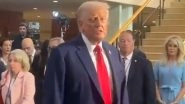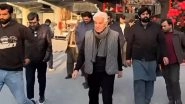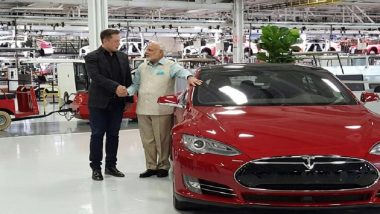Tesla CEO Elon Musk said on Wednesday that he has looked at expanding the electric car’s market base to include India but the current government regulations means he cannot do so as yet.
"Would love to be in India. Some challenging government regulations, unfortunately," Elon Musk tweeted in a response to a Twitter user who wrote "No Tesla in India" to him.
Would love to be in India. Some challenging government regulations, unfortunately. Deepak Ahuja, our CFO, is from India. Tesla will be there as soon as he believes we should.
— Elon Musk (@elonmusk) May 30, 2018
Earlier this month, the California-based company moved a step closer to establishing a factory in China, which would be its first production facility outside U.S, as Beijing eases rules for carmakers such as Tesla.
"Deepak Ahuja, our CFO, is from India. Tesla will be there as soon as he believes we should," added Elon Musk, also the SpaceX founder. Ahuja, an experienced auto industry finance executive with 15 years experience at Ford Motor Company, joined Tesla Motors as Chief Financial Officer in 2010.
Last year, Elon Musk said Tesla's cars could come to India by next summer but there has not been any further development. Tesla was expected to enter India with its most affordable car, the Model 3, that sells for nearly $35,000 and achieves a range of 215 miles/ 350 kms per charge. Musk had said last year that Tesla was in discussions with the government, requesting temporary waiver of import penalties and other restrictions until a local facility is built.
The Indian Express also reports that Tesla had collected $1000 deposit in 2016 from interested buyers in India but they have yet to receive any notification about a possible delivery date.
The CEO later blamed the FDI norms in India for delay in Tesla's entry into the Indian market. "Maybe I'm misinformed, but I was told that 30% of parts must be locally sourced and the supply doesn't yet exist in India to support that," he had tweeted.
The Make in India's Twitter handle replied: "@elonmusk With respect to news reports on launch plans of Tesla in India being delayed, please note some key clarifications#MakeInIndia".
Prime Minister Modi had announced a goal for all newly sold cars in India to be electric models by 2030, a target which is seen as too ambitious by car-makers because of poor infrastructure for recharging and limited manufacturing capabilities for automotive parts.
(The above story first appeared on LatestLY on May 31, 2018 08:03 AM IST. For more news and updates on politics, world, sports, entertainment and lifestyle, log on to our website latestly.com).













 Quickly
Quickly


